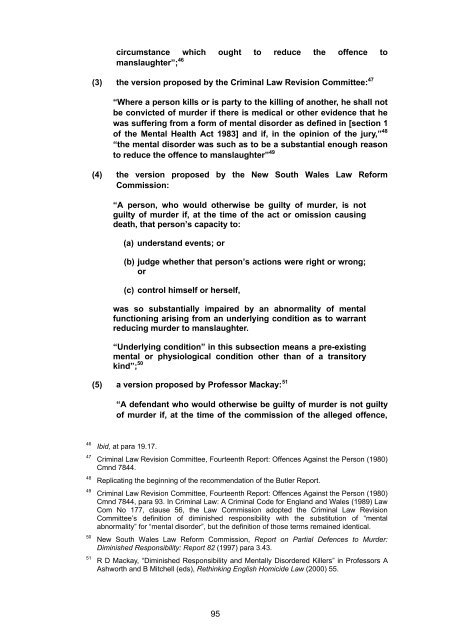lc290 Partial Defences to Murder report - Law Commission
lc290 Partial Defences to Murder report - Law Commission
lc290 Partial Defences to Murder report - Law Commission
Create successful ePaper yourself
Turn your PDF publications into a flip-book with our unique Google optimized e-Paper software.
circumstance which ought <strong>to</strong> reduce the offence <strong>to</strong><br />
manslaughter”; 46<br />
(3) the version proposed by the Criminal <strong>Law</strong> Revision Committee: 47<br />
“Where a person kills or is party <strong>to</strong> the killing of another, he shall not<br />
be convicted of murder if there is medical or other evidence that he<br />
was suffering from a form of mental disorder as defined in [section 1<br />
of the Mental Health Act 1983] and if, in the opinion of the jury,” 48<br />
“the mental disorder was such as <strong>to</strong> be a substantial enough reason<br />
<strong>to</strong> reduce the offence <strong>to</strong> manslaughter” 49<br />
(4) the version proposed by the New South Wales <strong>Law</strong> Reform<br />
<strong>Commission</strong>:<br />
“A person, who would otherwise be guilty of murder, is not<br />
guilty of murder if, at the time of the act or omission causing<br />
death, that person’s capacity <strong>to</strong>:<br />
(a) understand events; or<br />
(b) judge whether that person’s actions were right or wrong;<br />
or<br />
(c) control himself or herself,<br />
was so substantially impaired by an abnormality of mental<br />
functioning arising from an underlying condition as <strong>to</strong> warrant<br />
reducing murder <strong>to</strong> manslaughter.<br />
“Underlying condition” in this subsection means a pre-existing<br />
mental or physiological condition other than of a transi<strong>to</strong>ry<br />
kind”; 50<br />
(5) a version proposed by Professor Mackay: 51<br />
“A defendant who would otherwise be guilty of murder is not guilty<br />
of murder if, at the time of the commission of the alleged offence,<br />
46 Ibid, at para 19.17.<br />
47 Criminal <strong>Law</strong> Revision Committee, Fourteenth Report: Offences Against the Person (1980)<br />
Cmnd 7844.<br />
48 Replicating the beginning of the recommendation of the Butler Report.<br />
49 Criminal <strong>Law</strong> Revision Committee, Fourteenth Report: Offences Against the Person (1980)<br />
Cmnd 7844, para 93. In Criminal <strong>Law</strong>: A Criminal Code for England and Wales (1989) <strong>Law</strong><br />
Com No 177, clause 56, the <strong>Law</strong> <strong>Commission</strong> adopted the Criminal <strong>Law</strong> Revision<br />
Committee’s definition of diminished responsibility with the substitution of “mental<br />
abnormality” for “mental disorder”, but the definition of those terms remained identical.<br />
50 New South Wales <strong>Law</strong> Reform <strong>Commission</strong>, Report on <strong>Partial</strong> <strong>Defences</strong> <strong>to</strong> <strong>Murder</strong>:<br />
Diminished Responsibility: Report 82 (1997) para 3.43.<br />
51 R D Mackay, “Diminished Responsibility and Mentally Disordered Killers” in Professors A<br />
Ashworth and B Mitchell (eds), Rethinking English Homicide <strong>Law</strong> (2000) 55.<br />
95

















